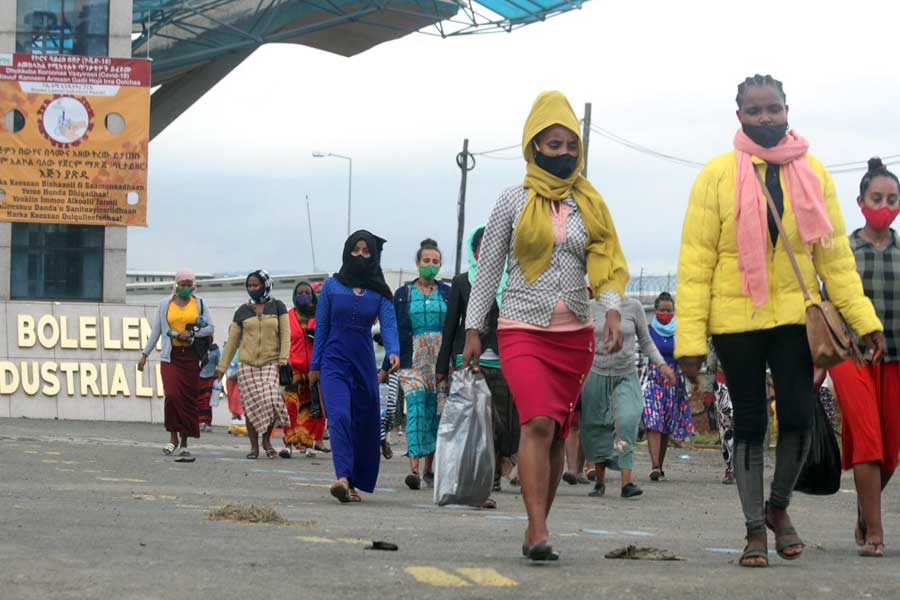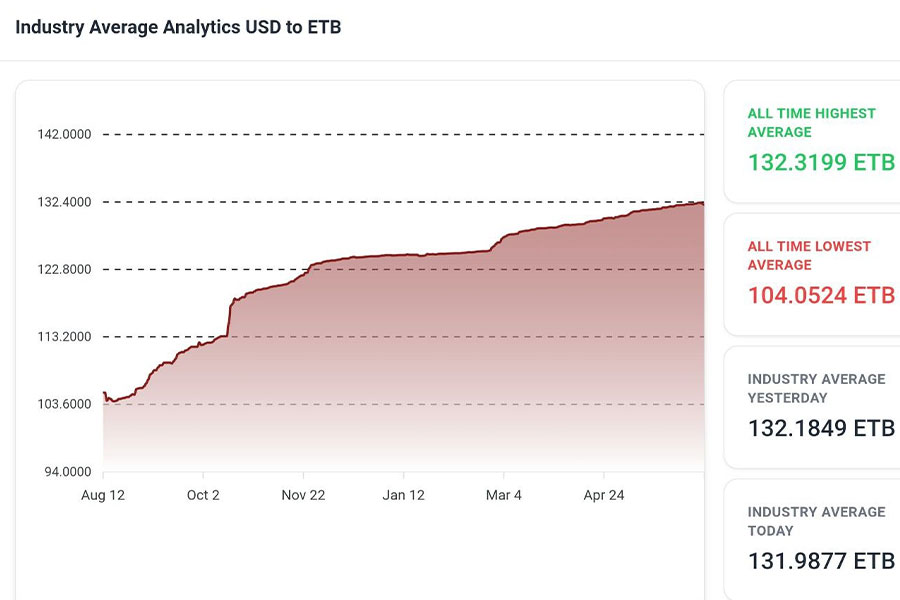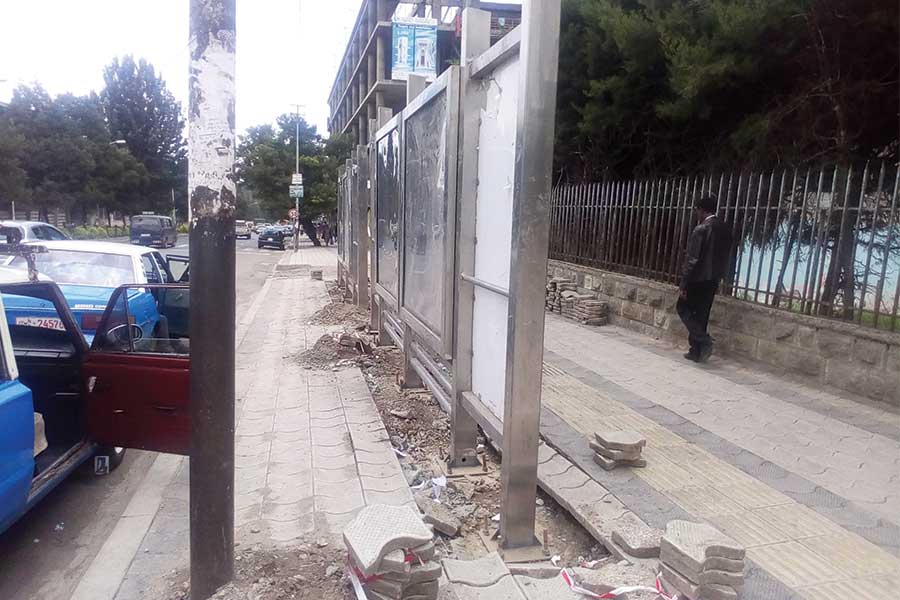
Haimanot Yonas discovered her exam result at dawn last week, squinting at a flickering phone outside the chemistry lab of Bisrate Gebriel International School, off South Africa St., near the church bearing the school's name. The line of digits confirmed that the slight and soft-spoken 18-year-old had earned the second-highest score in last year’s secondary school leaving national exam, the highest among all female candidates.
Haimanot had spent most evenings hunched over textbooks while friends traded memes.
“I always believed I would do well,” she said, breath visible in the cool morning air. “But, I never imagined the score would be this high.”
Her teachers call her methodical. She revised each concept until it felt solid, then hunted for harder questions. Even so, her grade in English startled her.
“Many of my classmates experienced the same,” she laughed.
Haimanot dreams of studying neuroscience, hoping to understand the injuries that war and hunger inflict on young minds and to prove that science can be harnessed for healing, not simply for academic purposes. Her achievement arrived as the Ministry of Education rolled out the most radical overhaul of the exam in decades.
Education officials, including the Minister, Berhanu Nega (Prof.), claim they are determined to stop mass exam cheating. They have moved testing from local schools to university campuses and introduced online sittings to choke off leaks. The Minister argued that the new format compels schools to teach ideas rather than answers, although critics say he has heaped fresh pressure on students already negotiating crowded classrooms, long commutes and patches of deadly conflict that still flare in parts of the country.
Last academic year, 585,991 students sat the exam, fewer than the previous year but still one of Africa’s biggest cohorts. Boarding schools topped the charts with a 71pc pass rate, community schools followed at 51pc. Online testing exploded, with 134,609 candidates taking digital papers, a 23pc jump, though only 21.7pc of them cleared the threshold. Federal education officials pledged to keep a remedial scheme, offering six months of tutoring and a second chance at university entry.
For every Haimanot, there is a Hanan Jamal, a resident of Bahir Dar, a seat of the Amhara Regional State Administration. The 19-year-old refreshed the same website and felt her nursing ambition slip away. The top student at Horizon Academy Preparatory School, one of the private schools that have 30.6pc pass rate, had spent months sketching anatomy diagrams under a dim bulb.
“It felt like the ground disappeared beneath me,” she said.
Students were ordered to unfamiliar lecture halls with little warning and shuffled between rooms. They were asked not to pay too much attention to invigilators, officials who supervise students taking an examination to ensure fairness, prevent cheating, and uphold the rules of the exam, tapping their phones or chewing gum.
In Jimma, the coffee capital of the west, 19-year-old Eyob Adu divided his days between school and two jobs, to support his widowed mother and five younger siblings. He revised algebra by torchlight. His result was also below the passing average.
“Everything I had worked for disappeared,” he said.
Statistics make the pain tangible. Over the past four years, nearly three million high school students have taken the retooled exam. Only about 142,600, less than five percent, scored results for university admission. In 2023/24, more than 1,300 schools registered no passes at all. Last year, that grim tally dropped, but only to 1,249, including 50 where every student passed.
Horizon Academy sent 30 students, and all of them fell short of their tertiary education goals. Eyasu Abera, the school's headmaster, blamed the chaotic logistics.
“Our students felt threatened and intimidated,” he said. “Even our strongest were shaken.”
He drafted counselling sessions, parent meetings and mock exams to prepare the next cohort.
Bisrate Gebriel School, by contrast, treated the change of policy as a puzzle to solve. Of 240 entrants, more than 210 passed. The Academic Manager, Zelalem Demisse, credited relentless feedback, Saturday workshops, and what he called “guidance on behaviour”.
“We focused on how students used every hour,” he said. “That turned changes into results.”
Minister Berhanu saw the year as a mixed picture.
“The results we want are beginning to appear,” he told Fortune. “This year’s outcome is good, though not yet enough."
His goal is to see 15pc to 20pc of students pass within the next two or three years. A population of over 100 million include nearly one in five aged between 15 and 24. Of 35.4 million school-aged children, only 22.9 million attend class, while militarised conflicts, drought and household poverty keep the rest at home. However, one-third progress to the secondary level, and 90pc of 10-year-olds cannot read a simple sentence. In the conflict-ravaged Amhara Regional State, 42pc are out of school.
HebleworkWube, 18, embodies these statistics. She missed the pass mark last year, enrolled in the government’s remedial course at Bahir Dar University and sat again, convinced extra coaching would lift her over the line. When the results were published, she had failed once more.
“I was sure this time I would make it,” she said. “But, it didn’t happen.”
Heblework is considering marriage and a career in retail.
“I feel lost,” she conceded.
Others, however, rebuild, such as Duresa Leta, a former student of Shashemene Preparatory School. He failed the exam but now studies for an IT diploma on weekends. The wages he earns decorating cars by day fund his siblings’ supplies and his own expenses.
“When I first took the exam, my dream was university,” he said. “Now, I have no regrets. I'm working to better myself and my family, and if it is part of God’s plan, I will finish my degree and find a good job.”
Analysts argue that these personal tales reveal structural weaknesses. Although they acknowledged the higher pass rate as encouraging compared to the previous year, they still viewed it as catastrophic. Real improvement, experts insist, will demand investment in teachers, textbooks, electricity and safe classrooms, not only in new rules.
One such close watcher of the education sector is Yohanes Benti (PhD), president of the Ethiopian Teachers Association. He observed success clustering in boarding and well-resourced community schools, while the majority of students study in buildings lacking books, electricity, and trained staff.
“The focus on exams prioritises testing over learning,” Yohanes said. “Education should cultivate creativity, innovation and problem-solving skills.”
Tirusew Tefera, a professor who lectures in special-needs and inclusive education at Addis Abeba University, was more blunt. He described the figures as “shocking and heartbreaking” and rejected the Minister's optimism.
“Changing the exam format alone will never guarantee quality,” he said. “Students are defined by more than whether they pass the 12th-grade exam. This is a detrimental mindset.”
Tirusew wants to see an independent review that examines exam design, invigilator competence, testing venues and student welfare. He urged the establishment of support centres in every school library and laboratory, where bare walls now stand.
“Without these systemic changes,” said Tirusew, “we'll continue to measure our children’s potential by a single exam and watch their confidence and our education system crumble.”
PUBLISHED ON
Sep 21,2025 [ VOL
26 , NO
1325]

Life Matters | Jul 13,2020

Viewpoints | Sep 21,2024

Sunday with Eden | Nov 16,2019

Fortune News | May 18,2024

Sunday with Eden | Aug 27,2022

Radar | Oct 23,2021

Agenda | Aug 01,2020

Money Market Watch | Jun 15,2025

Radar | Oct 12,2019

Radar | Aug 10,2019

Dec 22 , 2024 . By TIZITA SHEWAFERAW
Charged with transforming colossal state-owned enterprises into modern and competitiv...

Aug 18 , 2024 . By AKSAH ITALO
Although predictable Yonas Zerihun's job in the ride-hailing service is not immune to...

Jul 28 , 2024 . By TIZITA SHEWAFERAW
Unhabitual, perhaps too many, Samuel Gebreyohannes, 38, used to occasionally enjoy a couple of beers at breakfast. However, he recently swit...

Jul 13 , 2024 . By AKSAH ITALO
Investors who rely on tractors, trucks, and field vehicles for commuting, transporting commodities, and f...

Oct 25 , 2025
The regulatory machinery is on overdrive. In only two years, no fewer than 35 new pro...

Oct 18 , 2025
The political establishment, notably the ruling party and its top brass, has become p...

Oct 11 , 2025
Ladislas Farago, a roving Associated Press (AP) correspondent, arrived in Ethiopia in...

Oct 4 , 2025
Eyob Tekalegn (PhD) had been in the Governor's chair for only weeks when, on Septembe...